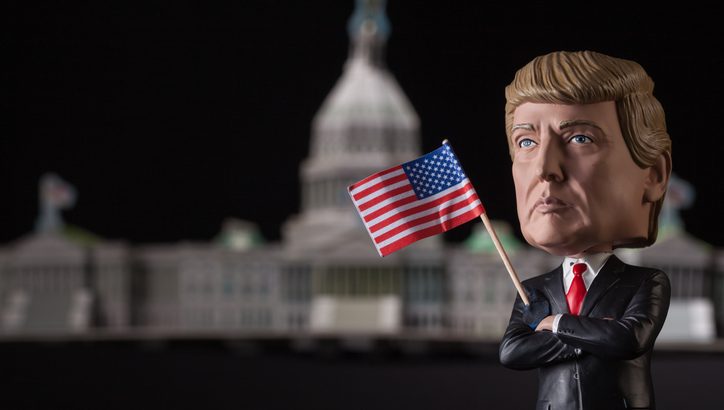Does going to an elite college make for a more effective legislator? That’s what research scientist Jonathan Wai and co-authors argue in a forthcoming paper. However, political scientist Nicholas Carnes (not one of the co-authors) notes that we shouldn’t overstate the extent to which education alone affects policy makers’ decisions. It’s important to also consider factors, he says, like the regions of the country elite-educated members represent and the ideologies of their constituents, Carnes says.
Read More in The Chronicle of Higher Education
What Will Kill Neoliberalism?
Suppose, indeed, that the age of capitalism is actually reaching its conclusion — but one that doesn’t involve the ascension of the working class. Suppose, instead, that we consider the existence of a third great social class vying with the other two for social dominance. …”
Read More in The Nation
It’s No Accident President Trump Keeps Invoking Our Nation’s 7th President
“Will Trump succeed in remaking politics as (Andrew) Jackson did? It will be four years before we know for sure, but so far the prospects don’t look good. Jackson’s popularity during his first term was both deep and broad, while Trump is popular with only a third of the electorate,” writes historian Reeve Huston.
Read More in The Hill
Corporate Tax Reform: Expect the Unexpected
Because President Trump’s plans are light on specifics and not revenue neutral, it is unlikely the plan will see substantive debate without significant changes. “To be viable, tax reform needs to be closer to revenue neutral,” says Fuqua professor Scott Dyreng. “That means that lowering the corporate tax rate would be accompanied by the elimination of many one-off deductions. … The reality is that congressional representatives who want re-election are reluctant to support any legislation that might increase the tax burden to firms in their districts.”
Read More from The Fuqua School of Business
Venezuela: From Richest Country in Latin America to ‘Basket Case’
Venezuela is on the verge of implosion. Inflation has skyrocketed, shortages of food and other basic necessities abound, and Venezuelans are increasingly fleeing the country and relocating around the region. “A country that was once the richest in Latin America is now a basket case, and the Bolivarians are to blame. The scope of their failure, with the world’s greatest reserves of oil, is just astounding,” says professor Patrick Duddy, a former ambassador to Venezuela.
Read More on The Cipher Brief
How Health Care Reform Could Hurt Women
Proposed changes to the Affordable Care Act would remove requirements to cover maternity care and contraception. Those changes would hurt women especially hard, says Dr. Megan Huchko, an associate professor in the Department of Obstetrics and Gynecology and the Duke Global Health Institute.
Listen on Glad You Asked

Real Populism Was Very Different From Trump’s Pseudo-Populism Today
“For months, we’ve been told that Donald Trump’s election was a ‘populist revolt,’ working-class, alienated white Americans dissatisfied with the growing economic inequality rising up against a self-satisfied Establishment. There is some truth in this. But real populism — such as that in the 1880s and 1890s — was very different from Trump’s pseudo-populism,” writes historian emeritus William Chafe.
Read More in The Hill
Choosing Which Cable Channels To Provide Is Speech, But Offering Internet Access Is Not
“The Supreme Court has always required substantive communication or self-expression as a necessary condition for the application of the First Amendment. And simply charging more money, or providing faster speeds, is not a substantive communication,” writes law professor Stuart Benjamin.
Read More in The Washington Post
Fat Years And Lean Years — Don’t Be Too Enthusiastic About Tax Cuts
“In the Bible, Joseph told Pharaoh to save during the seven fat years to support society during the seven lean years. This story is worth remembering now that the Trump administration is proposing a new round of tax cuts in an effort to stimulate economic growth,” writes Dr. Kevin Schulman, a professor of medicine. “It is also worth remembering that this tax-cut approach was tried in the 1980s, and led to increases in the federal deficit.”
Read More in The Hill
An Increase in Women Legislators Is Linked to Fewer Infant Deaths
A study led by Patricia Homan, a doctoral candidate in sociology, finds that American states with higher percentages of women in their legislatures enjoy lower infant mortality rates. She found this relationship both when making state-to-state comparisons, and when looking at the same state’s statistics over the years. “These findings underscore the importance of women’s political representation for population health,” Homan writes in the journal Social Science and Medicine.
Read More in Pacific Standard
In 100 days, Donald Trump Hasn’t Done Much
“It’s show and tell,” historian emeritus William Chafe says of the president’s executive order signings. “It’s basically trying to create the impression of decisiveness.” In Chafe’s view, it’s actually a misimpression, given the lack of a single significant piece of legislation to pass under Trump’s watch, including the 10 he specifically promised he would shepherd through Congress in his first 100 days.
Read More in The Huffington Post

NAFTA and Global Value Chains
“A winning way to view the world is through the lens of regional value chains competing with each other. North America is competing with Europe and East Asia, rather than the U.S. competing with Germany and China,” writes Gary Gereffi, director of the Center on Globalization, Governance & Competitiveness at Duke. “The national approach is an outdated framework from the economic standpoint. Most industries today are organized into regional and global supply chains, which requires a new calculus of winners and losers involving both workers and companies.”
Read More at Brookings.com

